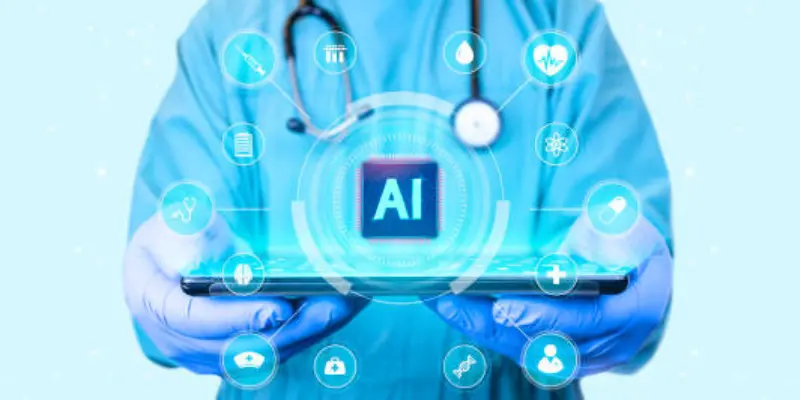How Advanced will AI in Healthcare be in 10 Years
Published: 4 May 2025
Imagine visiting a hospital where smart robots assist doctors and AI tools catch diseases before symptoms even appear. It might sound like something from a sci-fi movie but in 10 years, this could become a reality in healthcare.
Today, AI already helps doctors make better decisions, detects diseases like cancer early and even manages patient records. But what about the next few years? How advanced will AI in healthcare be in the next decade?
In this post, I am going to talk about advancements of Healthcare AI in Next 10 years. From smarter diagnoses to robotic surgeries and personalized treatments, let’s look at the exciting possibilities.

A Quick Look at AI in Healthcare Today
Before we talk about the future, let’s see what AI is already doing in healthcare right now. It’s more common than most people think.
What AI Does Today
- Finds diseases early
AI can look at scans like X-rays or MRIs and spot signs of illness. It helps doctors to catch problems like cancer or lung infections sooner. - Supports doctors in making decisions
Some AI tools suggest possible diagnoses or treatment plans. Doctors still decide what’s best but AI gives helpful ideas fast. - Handles records and paperwork
AI helps in managing patient files, appointments and billing. This saves time for nurses and hospital staff. - Answers patient questions
Chatbots or voice assistants can answer common health questions and remind patients to take their medicine.
Real-Life Example
One well-known tool is IBM Watson Health. It can read thousands of medical papers in seconds and help doctors choose better treatments, especially for cancer.
Suggested Article: Risks of AI Associated with Diagnosing Diseases
Interesting Fact
Did you know?
According to multiple studies, AI can sometimes spot breast cancer in scans two to six years earlier than a human doctor. That means patients can start treatment much sooner.
What Healthcare Might Look Like in 10 Years
AI is growing fast and healthcare is changing with it. In 10 years, hospitals may feel very different. From smarter tools to AI doctors on your phone, the future looks exciting and a little surprising too.
Let’s break it down.
A. Smart Diagnosis Will Get Smarter
Today, AI helps doctors in finding and diagnosing diseases. But in the future, it may find health problems before they even start.
- AI could study your voice, sleep, steps, heart rate and more from your phone or smartwatch.
- It might warn you early if something looks risky like high blood pressure or a possible stroke.
- AI may even predict future illnesses by reading your genes or family history.
Example:
Researchers are testing AI tools that listen to your voice during a normal call. If your voice sounds weak or shaky, the AI might flag heart problems. You get help sooner and maybe avoid a big health issue.
B. Robotic Surgeries Could Become Common
Right now, some hospitals use AI-assisted robots in surgery. In 10 years, robotic surgery might be normal in many places.
- These robots can make very small, precise movements. This means less bleeding, fewer cuts and faster healing.
- They can also work with a steady hand, which helps in difficult surgeries like brain or eye procedures.
- Doctors still control the robots but AI will help them do the job faster and safer.
Real-life Example:
The Da Vinci robot already helps with delicate surgeries like prostate and heart operations. Future versions may even work on their own in simple cases, under a doctor’s watch.
Also Read: Top 10 AI Caregiver Tools in Healthcare 2025
C. Personalized Treatment Plans
Right now, many people get the same treatments for the same illness. But every person is different. In next 10 years, AI could create treatment plans made just for you.
- AI may study your DNA, habits, age and past health problems.
- It will compare your case to millions of others and choose what works best for your body.
- This means better results and fewer side effects.
Example:
Let’s say two people have the same cancer. One responds well to Drug A, but the other needs Drug B. AI can find the best option by looking at your body’s unique data.

D. Virtual AI Doctors and Nurses
In the future, you may not always need to visit a clinic. Virtual AI health assistants could handle many tasks.
- They can answer common health questions like “What can I take for a headache?”
- They might also give reminders to take your pills, drink water or exercise.
- Some may even watch your health through wearables and send alerts if something looks wrong.
Example:
Apps like Ada or Babylon Health already offer simple checkups through chat. In 10 years, these tools may feel like talking to a real nurse.
E. Better Hospital Management
AI will not only help patients, it will also make hospitals run better.
- AI can manage appointments, room availability, staff schedules and medicine supplies.
- It may predict busy times and help hospitals prepare.
- This means less waiting, fewer errors and better care for everyone.
Example:
AI tools can warn hospitals when flu season is near by watching search data and past records. Staff can get ready before patients arrive.
The next 10 years of healthcare will bring faster help, smarter tools and more personal care and all with the support of AI.
Exciting, right?
Challenges That May Still Exist
Even with all the amazing things AI can do, there will still be some problems. Let’s look at a few challenges we may face in the next 10 years.
A. Not Everyone Will Have Access
AI may help hospitals a lot but some people may still be left behind.
- Small clinics or rural areas may not afford costly tech tools.
- People without good internet or smartphones may not use AI apps easily.
- This creates a gap where some people get better care than others.

B. AI Needs a Lot of Good Data
For AI to work well, it needs lots of patient data. But that’s not always easy to get.
- Some hospitals don’t store data properly.
- Some patient records are missing or incomplete.
- If the data is not diverse, AI may give wrong answers for certain groups.
C. Privacy and Security Risks
Patient data is very private. If AI tools store or share it the wrong way, it can lead to problems.
- Hackers may try to steal health records.
- People may worry that AI knows too much about them.
- Rules must be in place to keep patient info safe.
D. People May Not Trust AI
Some people may feel nervous about AI in healthcare.
- They may not understand how it works.
- They may fear mistakes or feel uncomfortable talking to a chatbot.
- They may think AI will take away their jobs in hospitals.
E. AI Still Makes Mistakes
AI is smart but not perfect. It can sometimes make wrong choices.
- If it learns from bad data, it gives bad results.
- If it faces a rare case, it may not know what to do.
- Doctors must always check AI results before using them.
Tips: How to Get Ready for the Next Ten Years of Healthcare AI
AI in healthcare is growing fast. But how can you get ready for it? Whether you are a patient, a doctor or just curious, here are some easy tips to help you prepare.
- Learn the basics of AI in healthcare
→ Watch simple videos or read short blogs to understand how AI helps doctors. - Ask your doctor about AI tools
→ Find out if your clinic uses AI for tests, scans or chat support. - Keep your health records safe and organized
→ Use a health app or folder to store your test results, allergies and history. - Be open to using health tech apps
→ Try new tools but always ask questions if you don’t understand how they work. - Share your health data only with trusted apps
→ Check reviews and privacy settings before using any medical app. - Use strong passwords for health apps
→ Add a two-step login to keep your health info safe from hackers. - Follow healthcare AI news and updates
→ Subscribe to a simple tech newsletter or podcast to learn about new tools. - Ask clear questions during doctor visits
→ Say things like, “Is this AI test better than the regular one?” or “Will a human check my results too?” - Join free webinars or health talks online
→ Look for local or online events that explain how AI is changing healthcare. - Stay calm and curious
→ AI is here to help, not replace doctors. The more you learn, the more confident you will feel.
Conclusion
So guys! In this article, we covered ‘Healthcare AI in Next 10 Years‘ in detail. The next ten year future of healthcare with AI looks incredibly promising with AI but it’s important to stay informed and prepared. I recommend keeping up with the latest trends and learning how new technologies can make your healthcare experience easier and safer. Don’t be afraid to ask your healthcare providers about AI tools that might be available to you. Start today by staying curious and taking control of your health data, this will help you get the most out of the healthcare AI revolution. Stay ahead of the curve and be proactive in your health journey!
Your Concerns About AI in Healthcare Over the Next 10 Years
Here are the frequently asked questions about AI in Healthcare in next 10 years:
No, within the next 10 years, AI will serve as a collaborative tool rather than a replacement for healthcare professionals. Doctors will increasingly use AI for routine tasks, diagnostics and data analysis while maintaining their critical roles in complex decision-making and patient care. The healthcare model by 2035 will likely feature a hybrid approach where AI handles efficiency while humans provide emotional intelligence.
Over the next decade, healthcare AI systems will implement increasingly sophisticated security measures including quantum encryption, blockchain verification and dynamic access controls. Stricter regulations specifically targeting AI use in healthcare will likely emerge worldwide, requiring transparency about how your data is used to train and operate these systems.
Within the next 5 years, most major insurance providers will begin covering FDA-approved AI diagnostic tools and treatment planning systems as evidence of their cost-effectiveness growth. By the end of the decade, insurance coverage will likely extend to virtual care visits with AI assistants and continuous monitoring through AI-powered wearables.
During the next 3-5 years, human healthcare providers will maintain final responsibility for decisions even when using AI tools, making liability relatively straightforward. By the end of the decade, we will likely see specialized medical AI insurance and clear regulatory frameworks that define responsibility among providers, AI developers and healthcare institutions.
In the short term (2-3 years), healthcare facilities will face higher costs as they invest in AI infrastructure and training. By mid-decade, we should see costs stabilizing as AI reduces hospital readmissions, medication errors and unnecessary procedures. By 2035, patients could potentially see lower insurance premiums and out-of-pocket costs as AI-driven preventive care and early intervention significantly reduce the need for expensive emergency treatments and long-term care.
In the early 2-3 years AI healthcare systems will still struggle with cultural biases but rapid improvements in diverse training data will happen mid-decade. By 2030, AI healthcare tools will likely incorporate cultural competency features including language customization, recognition of traditional healing practices and adaptations for different cultural understandings of health. The decade’s end should bring personalized cultural adaptations in AI healthcare interactions, where systems automatically adjust their approach based on a patient’s cultural background and preferences.
The next 3-5 years will see more “invisible AI” systems that work behind the scenes without requiring technical knowledge from elderly users. By mid-decade, it is expected to see specialized AI interfaces designed specifically for seniors, featuring voice-activated systems, simplified visualizations and even companion robots in some care settings. By 2035, many elderly patients will have grown more comfortable with technology naturally and healthcare AI will be designed with aging-friendly features from the ground up rather than as an afterthought.
Throughout the next decade, patients will maintain the legal right to opt out of AI-driven care and request traditional human-only healthcare. By mid-decade, many healthcare systems will likely offer tiered service models with varying levels of AI involvement, allowing patients to choose their comfort level. However, by 2035, completely avoiding AI influence may become challenging as even human doctors will routinely use AI tools with their jobs.
Within the next 3-5 years, more sophisticated edge computing will allow AI health tools to perform complex functions without constant internet connectivity. By 2030, we could see AI health hubs that can serve communities with limited connectivity, requiring only periodic updates rather than constant connections. The end of the decade should bring ultra-efficient AI models that can run advanced healthcare functions on minimal hardware with low power requirements, making them viable even in remote regions with infrastructure challenges.
Medical schools will introduce basic AI literacy courses within the next 2-3 years, focusing on how to interpret AI recommendations and understand their limitations. By mid-decade, clinical rotations will likely include specific training on collaborative decision-making with AI systems using simulations and real-world practice. By 2035, medical education will have fundamentally transformed to emphasize uniquely human skills like complex reasoning, empathy and ethical judgment, while technical knowledge will shift toward effectively overseeing and collaborating with increasingly capable AI systems.





